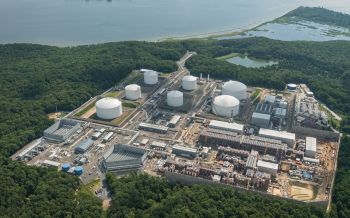China’s response to the coronavirus outbreak has spawned hydra-headed crises that are now reverberating through global industries, disrupting supply chains and crashing commodity markets. The effect upon LNG has been profound, coming at the worst possible moment as the industry grapples with rock-bottom spot prices that were already threatening to tip the economic calculus against lifting cargoes from some US liquefaction plants.
US LNG shut-ins are not yet known to have occurred, but this will become inevitable with current Asian LNG spot prices. CME’s Japan-Korea Marker (JKM) futures contract for April delivery closed yesterday at USD 2.99/MMBtu, the lowest it has ever been. Anecdotal accounts suggest cargoes are being sold in the Gulf of Mexico free on-board at 115% of Henry Hub – i.e. USD 2.14/MMBtu – a price that covers only feedgas and pipeline costs, with no coverage for liquefaction.
US liquefaction shut-ins would remove a crucial outlet for US shale operators already struggling to get associated gas to market. Tudor, Pickering and Holt this week said nearly two-thirds of US natural gas production, or ~55 Bcf/d, is at risk in the current price environment – a figure that equates roughly to the amount of production from non-associated gas wells. Further downward pressure on Henry Hub could trigger mass shut-ins at wells with little or no oil component to shore up revenue.
The immediate pain being felt by upstream LNG producers and holders of out-of-the-money liquefaction tolling contracts will be significant. So is the irritation felt by buyers locked into long-term oil-indexed purchases, as the premium they pay over spot increases. The clamour for price renegotiations is intensifying as the bottom drops out of the spot market.
Amid reports of mass diversions of container shipping deliveries away from China and car manufacturers such as Fiat Chrysler warning of a potential halt to production as far away as Europe, there is no clear view of when Chinese economic activity – and with it, LNG demand – might return to pre-coronavirus levels.
Against this backdrop, even those LNG producers holding binding long-term sales contracts now priced at several multiples of spot must sense unease. The longer this situation prevails, the more doubts will be raised around their buyers’ ability and appetite to uphold their side of the bargain. At what point does contract breach and arbitration become preferable to paying for the next cargo?
While the timing of that inflection point remains uncertain, those trying to convince buyers to commit to any new long-term purchase of LNG or investment in liquefaction capacity growth are staring at the reality that sentiment is shifting decisively in the opposite direction. There is nothing to suggest the market will signal for additional supply for the foreseeable future, regardless of how robust projections of supply-demand tightness in 2022-23 might appear on paper.
In the meantime, governments hoping to secure investment in gas resources will struggle to do so, as upstream companies will not invest if they cannot see a return. Moreover, low prices crimp international oil companies’ capacity to invest, leading to demands for improved terms from governments. Papua New Guinea’s failed renegotiation with ExxonMobil over the royalty terms of the P’nyang gas field is instructive.
Uncharted territory
Value is being squeezed out of the gas chain, and coronavirus is applying vigour to the twisting hand. If the contagion were magically resolved overnight and Chinese economic activity returned to normal on Monday, the direction of travel would not alter – only the velocity.
This raises the question of when value will return, and where. It seems unlikely to disappear forever, but nor is it likely to return quickly. Some segments might never fully recover, experts are warning.
“This crisis will likely accelerate existing trends and perhaps move banks away from an obsession with contract structure towards market fundamentals when financing LNG projects,” a gas market expert told Gas Matters Today. “This in turn may make it easier to finance LNG projects with attractive fundamentals,” the source said, citing Qatar, Senegal and Mozambique as examples.
LNG commoditisation has been accelerating in recent years and hub prices have converged dramatically, as evidenced in the vanishing ‘Asian premium’ for gas. The logical destination is that pricing spreads and arbitrage value will become a shorthand for the cost of transporting LNG from the nearest available source of supply – be that the Gulf of Mexico, the far east of Russia, or the east coast of Africa – to global demand centres.
To the extent that this trend blurs the lines between gas and LNG pricing and exerts enduring, structural pressure on prices, demand will respond accordingly – within the constraints of infrastructure capacity.
Price-sensitive markets have been slow to respond to the current pricing signals, but a sustained global flood of LNG will prove irresistible and balance will be restored – possibly to the detriment of Russian pipeline gas demand in Europe and coal consumption in Asia. LNG supply at the wrong end of the economic merit order will become exposed once demand growth is exhausted.
Uncertainties abound over when exactly the rebalancing might start to happen, where, and how quickly. There is also no guarantee that market players with the greatest exposure to the coronavirus-fuelled market collapse will still be in the business and positioned to play a profitable role in the recovery. - SK
Subscription Benefits
Our three titles – LNG Business Review, Gas Matters and Gas Matters Today – tackle the biggest questions on global developments and major industry trends through a mixture of news, profiles and analysis.
LNG Business Review
LNG Business Review seeks to discover new truths about today’s LNG industry. It strives to widen market players’ scope of reference by actively engaging with events, offering new perspectives while challenging existing ones, and never shying away from being a platform for debate.
Gas Matters
Gas Matters digs deep into the stories of today, keeping the challenges of tomorrow in its sights. Weekly features and interviews, informed by unrivalled in-house expertise, offer a fresh perspective on events as well as thoughtful, intelligent analysis that dares to challenge the status quo.
Gas Matters Today
Gas Matters Today cuts through the bluster of online news and views to offer trustworthy, informed perspectives on major events shaping the gas and LNG industries. This daily news service provides unparalleled insight by drawing on the collective knowledge of in-house reporters, specialist contributors and extensive archive to go beyond the headlines, making it essential reading for gas industry professionals.





